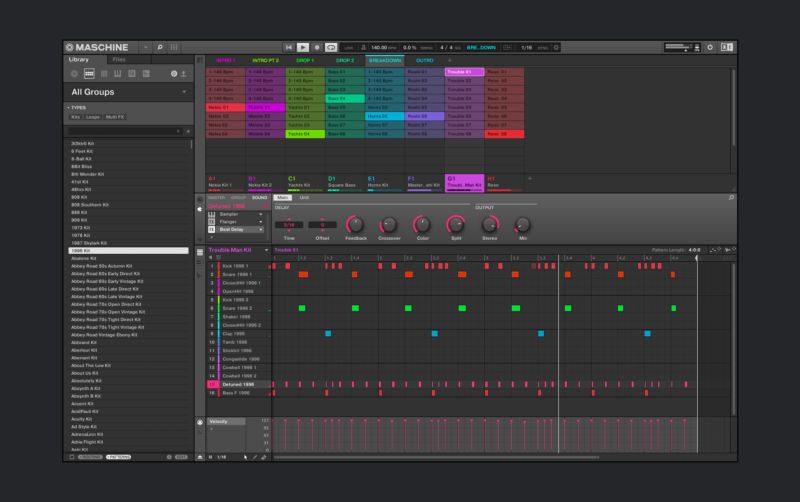

- #Native instruments maschine mikro controller upgrade#
- #Native instruments maschine mikro controller software#
The note repeat button has also been made larger, making it much more difficult to miss in the heat of the moment, and the volume, swing and tempo buttons are now clustered around it. They’re bigger and feel better to play, whether you drum out rhythms with one hand or two. As with the Studio, editing patterns with these screens can be fiddly and time consuming, but they’re great for editing audio samples.Īnother eye-catching improvement is the MK3’s drum pads. These displays are primarily used for browsing sounds and tweaking effects in tandem with the eight knobs, but also for controlling a graphical mixer and editing your patterns. As with the Maschine Studio screens, they’re not iPhone Retina quality, but still sharp enough to display small text very clearly. The main cosmetic difference is the two high-resolution color screens. The luxurious matte black finish of the Ableton Push is clearly an inspiration even the function names on the buttons have been etched or enclosed inside the rubber, rather than simply printed on. The layout isn’t unfamiliar either, but the difference in build quality is pretty astounding. It’s also a bit heavier at 4.85 lbs, though the solid metal chassis gives it the impression of being much weightier than it is.

However, it’s the first Maschine since the original that feels like a real step forward more significant, even, than the high-end Maschine Studio.Īt 12.6″ x 11.85″ x 1.61″, the MK3 is just a little longer then the MK2, but almost an inch shorter. Maschine MK3, which launches on October 5 at $599/£479, isn’t a radical change in design.
#Native instruments maschine mikro controller upgrade#
Maschine, however, hasn’t changed much: the original model got a largely cosmetic upgrade in 2012, while 2013’s gigantic (and expensive) Maschine Studio added high-resolution color screens and a jog dial. In 2012, Ableton joined the party with its own hardware controller for Live called Push, and companies like Arturia and Akai have thrown their own hats in the ring, with varying degrees of success. But the tradeoff was worthwhile: Maschine’s huge drum library and later support for VST plug-ins has made it more of a digital studio than a simple drum machine.Ī lot has changed since the first Maschine was launched. The downside of this was that you couldn’t use it unless it was hooked up to a laptop.
#Native instruments maschine mikro controller software#
It took the decades-old concept of a hardware sampler (specifically Akai’s MPC) and linked it to companion software that ran on your computer. When the first model arrived in 2009, Maschine was a trailblazer. Few companies understand this quite like Native Instruments, whose Maschine set the blueprint for a system that seamlessly combines hardware and software into one package.

Whether you’re a complete beginner or a seasoned veteran, the promise of a piece of hardware that allows you to make professional-sounding music no matter your ability level is extremely alluring. But is the new model just a re-skinned version of eight-year-old hardware? Scott Wilson finds out if the Maschine MK3 is worth the cash.Įvery producer wants that one thing that does it all in the studio. Native Instruments’ new Maschine is the most radical redesign to the controller since it transformed beatmaking back in 2009.


 0 kommentar(er)
0 kommentar(er)
